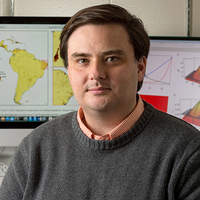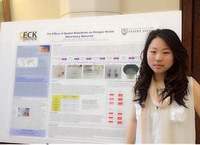Deputy Director of President’s Malaria Initiative to Lead Notre Dame’s Eck Institute for Global Health

Bernard Nahlen, currently deputy director of the President’s Malaria Initiative, will join the University of Notre Dame as director of the Eck Institute for Global Health and professor of biological sciences in the College of Science.
The Power of Computational Modeling to Combat Diseases

For people living in the US, the Zika epidemic of 2016 seemed to have come out of nowhere and to have now almost disappeared. Zika infections and microcephaly in newborns were daily headline news. Now where are we?
How being sick impacts a person’s behavior

Alex Perkins, Ph.D., Eck Family Assistant Professor in the Departments of Biological Sciences and Applied and Computational Mathematics and Statistics, and a member of the Eck Institute for Global Health, recently published a study looking at behavior of patients with one of the most common symptoms of disease: fever. Surprisingly, the impact of this common disease symptom on the mobility and contact patterns of an infected person is rarely studied and “seldom accounted for in mathematical models of transmission dynamics.”
Notre Dame Biology student recognized for outstanding contributions to science

Graduating Biology major, Diane Choi, is being honored with multiple academic achievement awards as the Class of 2016 prepares for graduation. Choi is the recipient of three major undergraduate awards for her work while a science student at Notre Dame. The awards include the Outstanding Biology Student Leader Award from the Department of Biological Sciences recognizing “a senior Biology major who has made outstanding contributions, through leadership and service, to advance the interests of other students in the department;”
With mosquito Y chromosome sequencing, researchers lay groundwork for advanced disease control

Human malaria, uniquely transmitted by a handful of anopheline mosquitoes, continues to attack nearly 200 million people and claims the lives of 600,000 each year. Africa bears the biggest burden due to its dominant vector, Anopheles gambiae. Ever since the groundbreaking Anopheles gambiae genome sequencing project was published in 2002, efforts have been underway to harness genomics for novel vector-based malaria control strategies. Nora J. Besansky, O’Hara Professor in the Department of Biological Sciences and member of the Eck Institute for Global Health at the University of Notre Dame, assembled a diverse and multinational team of scientists to crack the genetic code of the Y chromosome in malaria mosquitoes for the first time.
Climate change is affecting disease-carrying mosquitoes and other insects
Insect-borne diseases — such as malaria, dengue, West Nile and the newly emerging chikungunya — infect a billion people every year; more than a million die each year and many more are disabled. The effects of climate change, according to Edwin Michael, professor of biological sciences and member of the Eck Institute for Global Health at the University of Notre Dame, mean these deadly diseases are no longer reserved for the developing world.